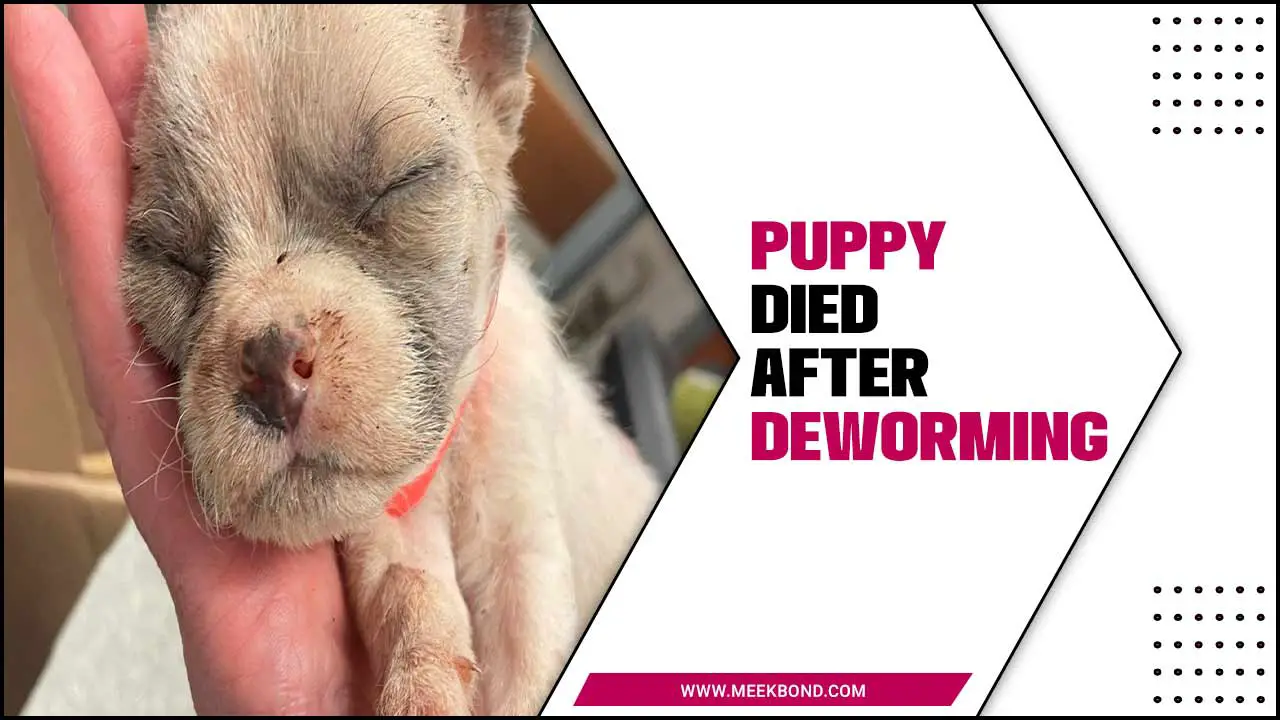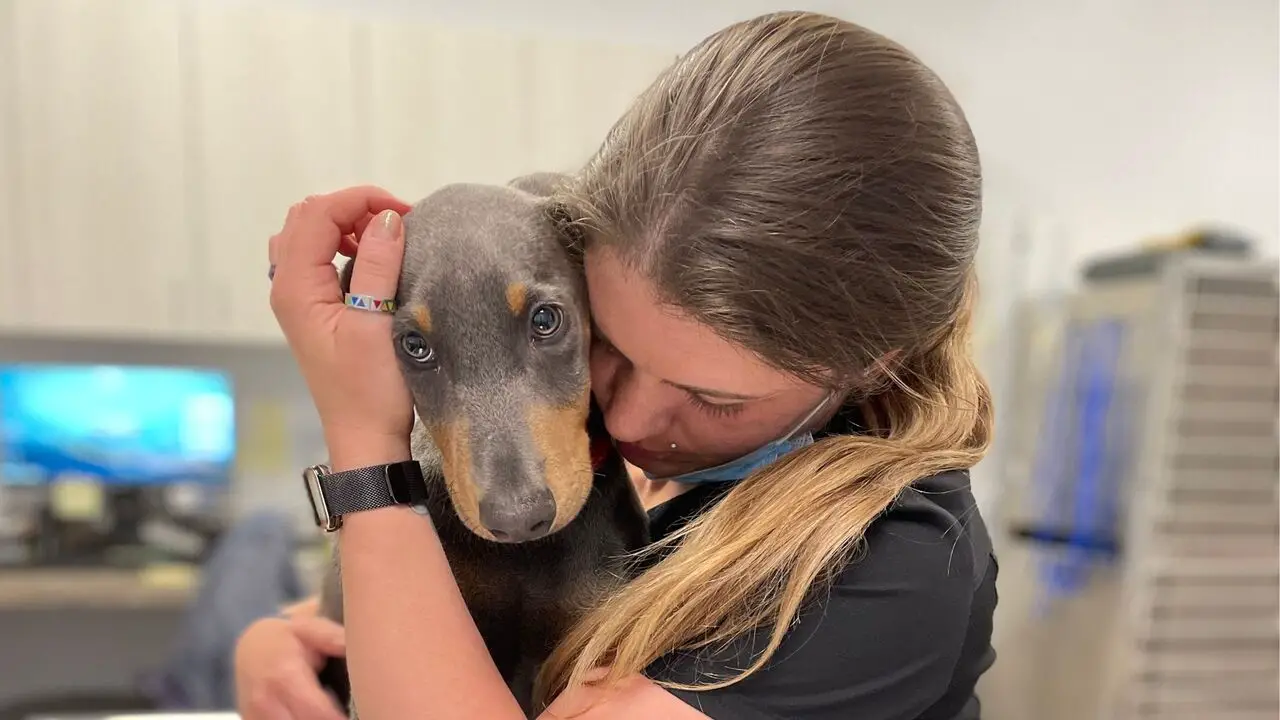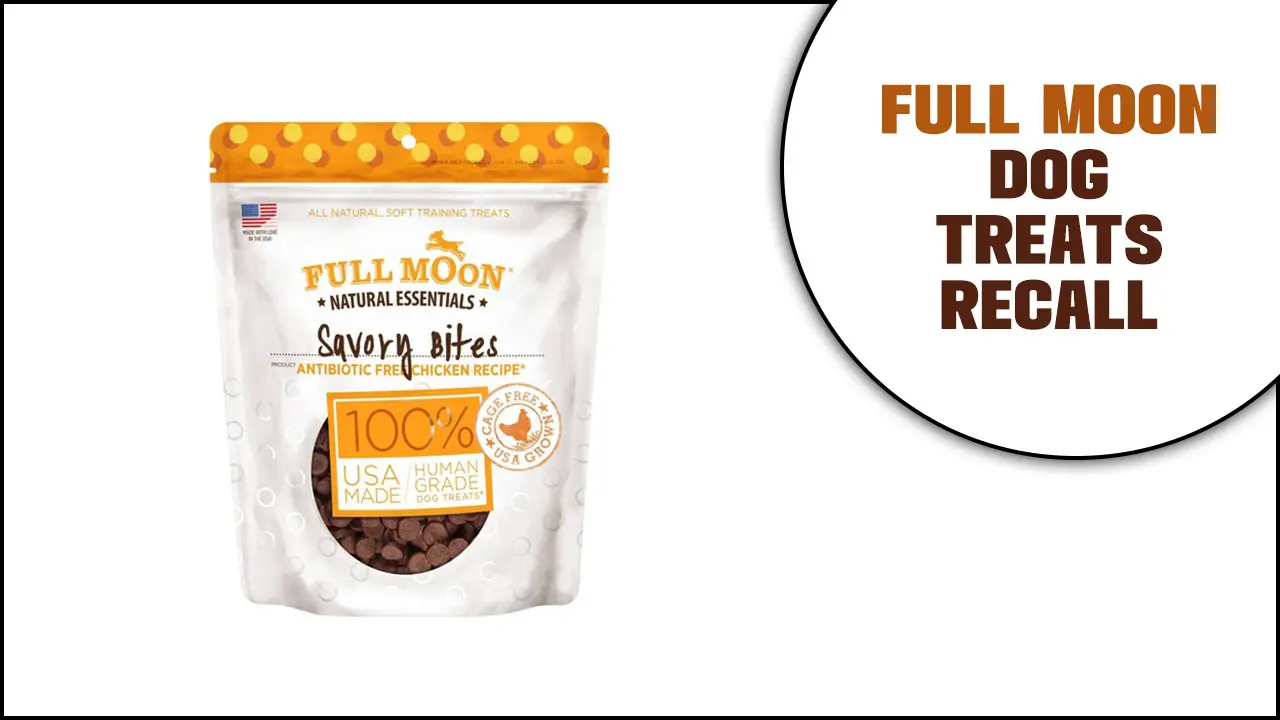Puppies are adorable creatures that bring joy and happiness to our lives. Puppy ownership is a rewarding experience that requires patience, love, and commitment. When you bring home a new puppy, you must be prepared to care for them as best as possible.
Puppies require attention and care, including regular feeding, exercise, and grooming. As pet owners, nothing is more heartbreaking than losing our beloved companions. The pain is exacerbated when the loss seems sudden and unexplained, as is often when a puppy dies after deworming.
Although deworming is essential to responsible pet care, it can sometimes lead to unexpected complications and even death. We’ll explore why my puppy died after deworming, the potential risks associated with deworming, and what steps you can take to protect your pet’s health by keeping it parasite free. Read on to find out.

My Puppy Died After Deworming – How Did This Even Happen?

Losing a puppy can be a devastating experience, especially if it happens after deworming. While deworming is a common and necessary procedure for puppies, it can sometimes lead to complications and even death. The most common reason for a puppy to die after deworming is an allergic reaction to the medication. These reactions can cause swelling, difficulty breathing, and even anaphylactic shock. Here are some of the factors that may puppy died after deworming:
- Sensitivity to medication: Just like people, some animals may have adverse reactions to certain medications, including dewormers. This can be due to various factors, such as age, weight, health conditions, or genetics.
- Overdose or incorrect dosage: Giving too much or too little of a dewormer can have serious consequences, as it can either overwhelm the pet’s system or fail to eliminate the parasites effectively.
- Underlying health problems: As an underlying health problem, deworming can worsen the condition and lead to death. It is important to have the pet examined by a veterinarian to rule out any underlying health problems before administering any medication or treatment. Additionally, it is important to follow the recommended dosage and frequency of deworming medication as the veterinarian prescribes.
- Reaction to medication: Some puppies may have an allergic reaction to the medication, leading to severe complications and even death.
Signs And Symptoms Of Deworming-Related Illnesses In Puppies

If you notice any of these symptoms in your puppy after deworming, it is important to contact your veterinarian immediately. They can help determine if the symptoms are related to the deworming medication or if an underlying health issue needs to be addressed. When it comes to deworming puppies, it is important to know the potential signs and symptoms of deworming-related illnesses. Some of these symptoms may include:
- Diarrhea
- Vomiting
- Loss of appetite
- Lethargy
- Dehydration
- Abdominal pain
In some cases, puppies may have an adverse reaction to the medication or be allergic to certain ingredients. It is important to follow the recommended dosage and administration instructions provided by your veterinarian and to monitor your puppy closely for any signs of illness after deworming. With proper care and attention, most puppies can successfully recover from deworming-related illnesses and continue to grow and thrive.
Potential Risks And Side Effects Of Deworming

Deworming is essential for maintaining the health of both domestic and wild animals. It is essential to consult a veterinarian before administering deworming medication to your pet. Your vet can assess your pet’s health status and prescribe the right dosage. Although it is a simple and effective process, deworming has potential risks and side effects. Here are a few things to keep in mind before administering deworming treatment to your pet:
- Allergic reactions: Some animals may be allergic to the ingredients in the deworming medication, leading to anaphylaxis, hives, itching, and swelling.
- Digestive Upset: Deworming can cause gastrointestinal disturbances such as vomiting, diarrhea, constipation, and loss of appetite.
- Overdose: Overdosing can lead to toxicity, resulting in seizures, tremors, and even death.
- Antibiotic Resistance: Deworming medications contain antibiotics that can lead to antibiotic resistance in animals.
Prevention Measures: How To Protect Your Puppy During Deworming
As a responsible pet owner, ensuring your pup is protected during deworming is important. Although deworming is necessary to prevent intestinal parasites, it can also cause discomfort and potentially harmful side effects if not done correctly. Here are some preventative measures you can take to protect your pup during deworming:
- Consult your veterinarian to determine your puppy’s appropriate deworming schedule and medication.
- Keep your puppy hydrated by providing plenty of clean water before and after deworming.
- Monitor your puppy for adverse reactions such as vomiting, diarrhea, or lethargy, and report to your veterinarian immediately.
- Administer anthelmintics as directed by your veterinarian, and do not exceed the recommended dosage.
- Keep your puppy away from other animals during and after deworming to avoid spreading parasites.
- Wash your hands thoroughly after administering the medication to prevent contamination.
- Give your puppy a calm and quiet environment.
Identifying A Reliable Veterinarian And Choosing Safe Deworming Products

Identifying a reliable veterinarian is crucial for every pet owner. It is essential to have a knowledgeable, experienced, and compassionate veterinarian. Finding a reliable veterinarian requires some research and recommendations from other pet owners. The veterinarian should have a good reputation, and their clinic should be equipped with the latest facilities. A good veterinarian should also be able to communicate effectively with the pet owner and provide comprehensive care for the pet.
Choosing safe deworming products is also important for pet owners. Deworming is essential to keep pets healthy and free from parasites. However, not all deworming products are safe for pets. Some deworming products can cause serious side effects and may even be toxic. It is important to choose a deworming product that is safe and effective. The best way to choose a safe deworming product is to consult a veterinarian. They can recommend the best deworming product based on the pet’s health condition and lifestyle.
Responding To A Deworming-Related Emergency: What To Do
As a pet owner, it is important to know what to do in case of a deworming-related emergency. Here are some steps to follow if your pet experiences adverse reactions to deworming medication. First, observe your pet for abnormal behavior or symptoms such as vomiting, diarrhea, lethargy, or loss of appetite. If you notice any of these symptoms, contact your veterinarian immediately. They will likely advise you to bring your pet in for an examination.
In the meantime, provide your pet with plenty of water to keep them hydrated. If your pet is experiencing vomiting or diarrhea, withhold food and treats until you have spoken with your veterinarian. Your pet may require hospitalization or intravenous fluids to address dehydration in severe cases.
It is important to follow your veterinarian’s instructions for deworming and to administer medication as directed. If you are unsure about the dosage or frequency of medication, ask your veterinarian for clarification. Remember, prevention is always better than treatment.
How Do I Know If The Deworming Killed My Puppy?
As a pet owner, it is important to ensure the health and well-being of your furry friend. One aspect that cannot be overlooked is deworming your puppy. However, wondering if the deworming medication has killed your puppy can be concerning. Here are some key points on how to know if the deworming has been effective or not:
- Look for signs of worms: After deworming, it is common to see dead worms in your puppy’s stool. If you notice them, it means the medication is working.
- Monitor your puppy’s behavior: If your puppy was lethargic or had a poor appetite before deworming, you should see an improvement in their energy and appetite after medication.
- Check for any adverse reactions: While rare, some puppies may have an adverse reaction to the deworming medication. Symptoms could include vomiting, diarrhea, or lethargy. If you notice any of these, contact your vet immediately.
What Should I Do If My Puppy Dies After Deworming?

Losing a puppy is a heartbreaking experience for any pet owner. Especially when it happens suddenly and unexpectedly. If your puppy dies after deworming, it can be a devastating shock. While deworming is a routine procedure, it can have adverse effects, and some puppies may have an allergic reaction to the medication. It is important to know what steps to take in these difficult situations. Here’s what you should do:
- Contact your vet: Contact your vet as soon as possible to inform them of the situation. They may want to know details about the deworming process and any symptoms your puppy may be experiencing.
- Arrange for a necropsy: Ask your vet about a necropsy to determine the cause of death. This can provide closure and valuable information for future pet health.
- Take Care of the Body: Arrange for proper disposal or burial of your dog’s body. Your vet can advise you on the best options.
- Seek support: The loss of a pet can be emotionally traumatic. Don’t hesitate to contact friends, family, or a professional counselor for support during this difficult time.
Conclusion
Deworming is the process of removing parasitic worms from the body and is essential for maintaining good health. Parasitic worms can cause various health problems, including anemia, malnutrition, and even death. Deworming is especially important in developing countries, where parasitic infections are more common due to poor sanitation and hygiene practices. The death of a beloved pet can be devastating for any pet owner.
In the case of deworming medication, it is important to understand that while it is generally safe and effective, there can be potential risks and side effects. It is always recommended to consult with a veterinarian before administering any medication to your pet and to follow their instructions carefully.
We’ve discussed Puppy Died After Deworming. If you have experienced the loss of a pet after deworming, it is important to seek support from friends, family, and potentially a pet grief counselor to help you through this difficult time.
FAQ
1.Is Dewormer Harmful To Puppies?
Ans: It depends on the type of dewormer and the age/health condition of the puppy. Some dewormers can harm very young or sick puppies, while others are safe for puppies as young as two weeks old. It is important to consult a veterinarian before administering any dewormer to a puppy.
2.Can Puppies Die If Not Dewormed?
Ans: Yes, puppies can die if not dewormed. Worm infestations can cause serious health problems in puppies, leading to malnutrition, anemia, and even death. Regular deworming is essential to keep puppies healthy and prevent potential health complications.
3.Can Puppies Overdose On Worm Medicine?
Ans: Yes, puppies can overdose on worm medicine if given too much medication or if it is inappropriate for their age or weight. It is important always to follow the recommended dosage guidelines and consult a veterinarian before administering any medication to a puppy.
4.How Much Dewormer Can I Give My 2-Week-Old Puppy?
Ans: It is important to consult a veterinarian before giving any medication, including dewormer, to a 2-week-old puppy. They may recommend a specific type and dosage based on the puppy’s weight and underlying health conditions.
5.Is It OK To Deworm A 1-Month-Old Puppy?
Ans: It is generally not recommended to deworm a 1-month-old puppy. Puppies should be at least 2-3 months old before being dewormed, as their immune and digestive systems are still developing and may not be able to handle the medication. It is best to consult a veterinarian for specific pet deworming recommendations.

Aquarium passion is all about connecting with the aquatic life and providing education to the public on the importance of these creatures. We showcase a wide variety of marine life through our exhibits as well as working with schools to provide unique learning opportunities for students of all ages.





